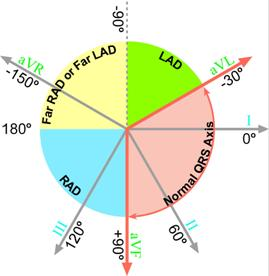Study and Memorize Medical Conditions With The Help Of Photos. Useful Site For Medical Students, Doctors And Nurses.
Tuesday, June 13, 2017
Understanding Cardiac Axis In ECG
Cardiac Axis Definition: It is the sum of all the depolarization waves as they spread through the ventricles as seen from the front.
Axis Determination
• Axis can be derived most easily from the amplitude of QRS complex in LI, LII and LIII.
• The greatest amplitude of R wave in LI or LII or LIII indicates the proximity of cardiac axis to that lead.
• The axis lies at 90° to the isoelectric complex, i.e. positive and negative deflections are equal in any of the lead LI, LII, LIII, aVL, aVR and aVF.
Normal axis is between –30° to +90°.
Quick and Simple Way of Determination of Cardiac Axis
• Positive QRS in both LI and LII means axis is normal.
• Positive QRS in LI and negative in LIII (tall R in LI and deep S in LIII)—means left axis deviation.
• Negative QRS in LI and positive in LIII ((tall R in LIII and deep S in LI)—means right axis deviation.
Left Axis Deviation
When the cardiac axis is between –30° to –90°.
Causes are :
• Normal variant (with increased age).
• Left ventricular hypertrophy.
• Left anterior hemiblock.
• Left bundle branch block.
• Inferior myocardial infarction.
• T from apex of left ventricle.
• WPW syndrome (some).
• Pacing from the apex of the right or left ventricle (endocardial pacing).
• Emphysema.
Left Axis Deviation
Right Axis Deviation
When the cardiac axis is between +90° to +180°.
Causes are:
• Normal variant (common in children and young adult).
• Right ventricular hypertrophy (due to any cause such as—chronic cor pulmonale, pulmonary embolism, congenital heart diseases, i.e. tetralogy of Fallot).
• Anterolateral myocardial infarction (high lateral MI).
• Left posterior hemiblock.
• Dextrocardia.
• WPW syndrome (type A).
• Right bundle branch block.
• Epicardial pacing.
Right Axis Deviation
Intermediate Axis
Occurs when QRS lies between +180° and –90°. This term is used when the exact axis can not be determined (all 6 limb leads are biphasic).
Subscribe to:
Post Comments (Atom)



No comments:
Post a Comment